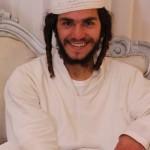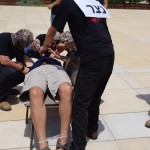Monday, May 18, 2020, 10:12 On Monday, May 18, Amiram Ben Uliel was convicted of the murder of three members of the Dawabshe family in the July 2015 arson attack in Kfar Duma. He was exonerated from the charge of belonging to a terror organization. Orian, Ben Uliel’s wife, interrupted the deliberation and called out to the panel of judges, “You have imprisoned an innocent man! The case is full of holes. You have convicted an innocent man!” Honenu has announced that it will appeal the conviction to the Supreme Court.
Shmuel (Zangi) Meidad, the director of Honenu, leveled sharp criticism at the court: “Today is a dark day for the State of Israel and for the citizens of Israel, the day on which a court in Israel took part in the conviction of an innocent man. The outrage cries out to the heavens. We believed that in the State of Israel human rights have value, that when a citizen is tortured to an extreme extent in the dungeons of the GSS until he is forced to confess to a crime which he did not commit, he would not be convicted on the basis of that confession. A confession such as that is worth less than nothing. We believed that the court would not close its eyes to the many discrepancies which arose during the trial and culminated in the indictment. We believed. However we were proven wrong.”
Meidad added: “The verdict which was handed down today befits regimes which we had hoped vanished from the world centuries ago. This blood libel, led by [former State Prosecutor] Shai Nitzan and his cronies, against Amiram and A., the minor in the case, has been endorsed by the court. ‘In the place of justice, evil is there’, said the wisest of all men [King Solomon, Ecc. 3:16] and it seems that there is nothing more appropriate for that sentence than what we have seen today. We hope that the Supreme Court knows to stop the injustice.”
Under interrogation and during the trial, Orian gave detailed testimony, including an alibi for Amiram. She testified that her husband had been with her at home on the night that three members of the Dawabsheh family were murdered in the July 2015 arson attack in Kfar Duma.
After the verdict was handed down, Orian Ben Uliel stated: “My husband is innocent. I testified to that effect for hours in court, including during cross examination. We brought eye witnesses. The court ignored all of it, convicted an innocent man and threw him in prison. For four years already my husband has been sitting in an isolated cell. They are trying to break him. We thought that today the truth would be revealed and he would be exonerated. This court will go down in infamy. This is a dark day. Today it is my husband. Tomorrow you or anyone else could find themselves in the GSS dungeons, receiving lethal blows, forced to admit to things they did not do, and the court will not stand up for them. There is no justice and no judge in the State of Israel.”
Honenu Attorneys Yitzhak Bam and Asher Ohayon are representing Ben Uliel. Bam: “After the court accepted the confession extracted under extreme duress and the reenactment [of the crime based on the confession], attaining a conviction was only a matter of legal acrobatics to connect the confession with the contradictory evidence discovered at the scene. Now that the court has successfully completed the acrobatic feat, a way to appeal to the Supreme Court has opened before us: accepting a confession given following torture. The one ray of light in the verdict is that the court did not convict Ben Uliel of belonging to a terror organization.”
For more details about the case see “Exposing the Duma Blood Libel”:
Part 1 focuses on the irregularities in the investigation of the case.
Part 2 focuses on the confession extracted from Ben Uliel under extreme duress during interrogation.
Part 3 focuses on the graffiti found at the scene, which an expert psychologist and graphologist determined does not match Ben Uliel’s handwriting, and was written by two different people.
Part 4 focuses on the problematic reenactment of the crime by Ben Uliel, who was guided by officers and interrogators who knew details of the investigation from close up.


